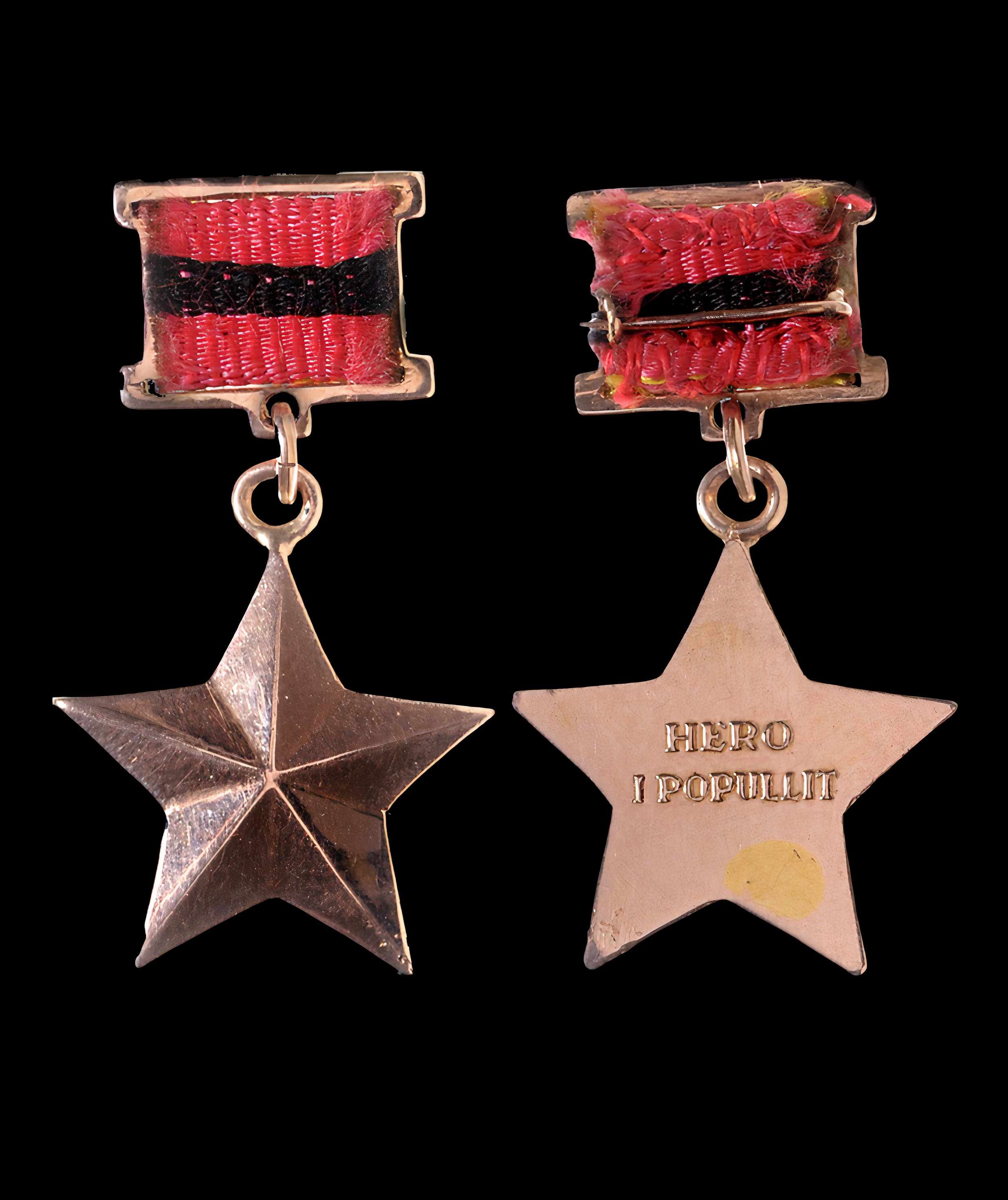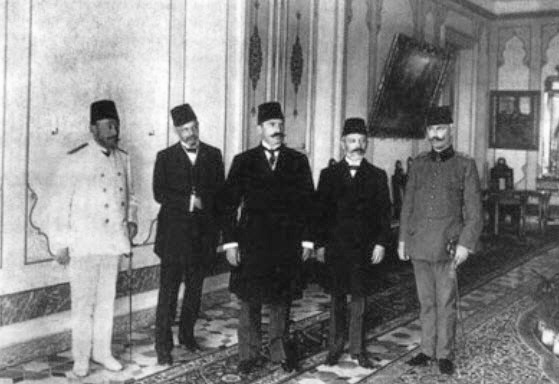|
Abdyl Frashëri
Abdyl Dume bey Frashëri ( tr, Fraşerli Abdül Bey; 1 June 1839 – 23 October 1892) was an Ottoman Albanian civil servant, politician during the First Constitutional Era of the Ottoman Empire, and one of the first Albanian political ideologues of the Albanian National Awakening. During his lifetime Frashëri endeavoured to instill among Albanians patriotism and a strong identity while promoting a reform program based on Albanian language education and literature. He was one of the initiators and a prominent leader of the League of Prizren. He distinguished himself as a political personality from the 1860s through early political assignments. He founded the Central Committee for Defending Albanian Rights in Istanbul. He furthermore served as a chosen representative for the Yanya Vilayet in the Ottoman Parliament during the First Constitutional Era, 1876–1877. During the communist regime he was proclaimed with the honour Hero of Albania. Early life Abdyl Frashëri was born i ... [...More Info...] [...Related Items...] OR: [Wikipedia] [Google] [Baidu] |
Frashër
Frashër (; sq-definite, Frashëri; rup, Farshar) is a village and a former municipality in the Gjirokastër County, southern Albania. At the 2015 local government reform it became a subdivision of the municipality Përmet. The population at the 2011 census was 387. The municipal unit consists of the villages Frashër, Zavalan, Ogren-Kostrec, Gostivisht, Miçan, Vërçisht, Kreshovë and Soropull. Frashër is widely regarded as the 'Mecca' of Albania and is known for the disproportionate number of prominent intellectuals it has produced - especially in the 19th and early 20th centuries. Name The name of the settlement means "ash-tree" in Albanian. The word '' frashër'' (Gheg Albanian: ''frashën'') derives from the Proto-Albanian rendering of Latin ''fraxinus''. The settlement represents an inhabited centre that was founded after the Roman period of the Albanian language. It is said that the Frashër area has been covered with ash forests, which disappeared over time. The A ... [...More Info...] [...Related Items...] OR: [Wikipedia] [Google] [Baidu] |
Mehdi Frashëri
Mehdi bey Frashëri (28 February 1872 – 25 May 1963) was an Albanian intellectual and politician. He served as Prime Minister of Albania in the 1930s and as Chairman of the Provisional Administration Committee in the Albanian puppet government under Nazi Germany. Biography Early life Mehdi Frashëri was born on 28 February 1872 in Frashër, Janina Vilayet, then Ottoman Empire. His father was Ragip bey kaymakam of Metsovo. Frashëri studied in Konica and Monastir and graduated from the Mekteb-i Mülkiye in Istanbul in 1897. While in Istanbul, in 1901, he was charged with establishing a small press in a local house cellar for printing Albanian nationalistic materials together with a small group of Albanians. Early political career and interwar period Frashëri served as Kaymakam of Peqin in central Albania between 1901 and 1903. After that he moved to Ohrid, where he joined the Secret Committee for the Liberation of Albania. He was denounced by a group of local Musli ... [...More Info...] [...Related Items...] OR: [Wikipedia] [Google] [Baidu] |
Berat
Berat (; sq-definite, Berati) is the ninth most populous city of Albania and the seat of Berat County and Berat Municipality. By air, it is north of Gjirokastër, west of Korçë, south of Tirana, and east of Fier. Berat is located in the south of the country. It is surrounded by mountains and hills, including Tomorr on the east that was declared a national park. The river Osum (total length ) runs through the city before it empties into the Seman within the Myzeqe Plain. The municipality of Berat was formed at the 2015 local government reform by the merger of the former municipalities Berat, Otllak, Roshnik, Sinjë, and Velabisht, that became municipal units. The seat of the municipality is the city Berat. The total population is 60,031 (2011 census), in a total area of . The population of the former municipality at the 2011 census was 32,606. Berat, designated a UNESCO World Heritage Site in 2008, comprises a unique style of architecture with influences from sever ... [...More Info...] [...Related Items...] OR: [Wikipedia] [Google] [Baidu] |
Timar
A timar was a land grant by the sultans of the Ottoman Empire between the fourteenth and sixteenth centuries, with an annual tax revenue of less than 20,000 akçes. The revenues produced from the land acted as compensation for military service. A holder of a timar was known as a timariot. If the revenues produced from the timar were from 20,000 to 100,000 ''akçes'', the land grant was called a '' zeamet'', and if they were above 100,000 ''akçes'', the grant would be called a '' hass''.Hütteroth and Abdulfattah, 1977, p. 99 Timar system In the Ottoman Empire, the timar system was one in which the projected revenue of a conquered territory was distributed in the form of temporary land grants among the Sipahis (cavalrymen) and other members of the military class including Janissaries and other kuls (slaves) of the sultan. These prebends were given as compensation for annual military service, for which they received no pay. In rare circumstances women could become timar ... [...More Info...] [...Related Items...] OR: [Wikipedia] [Google] [Baidu] |
Bektashi Order
The Bektashi Order; sq, Tarikati Bektashi; tr, Bektaşi or Bektashism is an Islamic Sufi mystic movement originating in the 13th-century. It is named after the Anatolian saint Haji Bektash Wali (d. 1271). The community is currently led by Baba Mondi, the eighth Bektashi Dedebaba and headquartered in Tirana, Albania. Bektashism began as a Shia Islamic Sufi order in Anatolia, during the Ottoman Empire. In 1876, a Salih Nijazi was appointed as the "''baba''" or leader by prominent Bektashi members. After the foundation of the Turkish Republic, Kemal Atatürk banned religious institutions that weren't part of the Directorate of Religious Affairs. After this, the community's headquarters relocated to Albania. The order became involved in Albanian politics, and some of its members, including Ismail Qemali, were major leaders of the Albanian National Awakening. Bektashis believe in the Twelve Imams, Fourteen Innocents and the modern-day Dedebabas. In addition to the spiritua ... [...More Info...] [...Related Items...] OR: [Wikipedia] [Google] [Baidu] |
Hero Of Albania
The Hero of the People ( sq, Hero i Popullit; Heroinë e Popullit) was the highest title bestowed upon the citizens of the People's Socialist Republic of Albania. Creation Founded on July 9, 1945, the title was awarded by the Presidium of the People's Assembly acting on a recommendation from the government. The main recipients were soldiers, officers, warrant officers, and generals in both the armed forces and in the Ministry of the Interior. The motives for issuing the award were as follows: # For heroic acts in the accomplishment of duties while defending the territory of Albania; # For personal or collective heroic accomplishments in time of war; # For courage and resolve in directing military units to victory against the enemy under difficult combat situations, thus rendering a great service to the state and to the people. Recipients Recipients received a certificate of the title as well as the badge (medallion). The families of those recipients who died or were declared mi ... [...More Info...] [...Related Items...] OR: [Wikipedia] [Google] [Baidu] |
Ottoman Parliament
The General Assembly ( tr, Meclis-i Umumî (French romanization: "Medjliss Oumoumi" ) or ''Genel Parlamento''; french: Assemblée Générale) was the first attempt at representative democracy by the imperial government of the Ottoman Empire. Also known as the Ottoman Parliament (french: Parlement Ottoman'' Legislation ottomane'' Volume 5: https://upload.wikimedia.org/wikipedia/commons/6/67/L%C3%A9gislation_ottomane_ou_Recueil_des_Aristarchi-Bey_Gr%C3%A9goire_Tome5.pdf p. 295 (PDF p. 299/370)), it was located in Constantinople (Istanbul) and was composed of two houses: an upper house (Senate, ''Meclis-i Âyân''), and a lower house (Chamber of Deputies, ''Meclis-i Mebusân''). The General Assembly was first constituted on 23 December 1876 and initially lasted until 14 February 1878, when it was dissolved by Sultan Abdul Hamid II. As a result of the Young Turk Revolution which brought substantial reforms and larger participation by political parties, the General Assembly was r ... [...More Info...] [...Related Items...] OR: [Wikipedia] [Google] [Baidu] |
Albanian Language
Albanian ( endonym: or ) is an Indo-European language and an independent branch of that family of languages. It is spoken by the Albanians in the Balkans and by the Albanian diaspora, which is generally concentrated in the Americas, Europe and Oceania. With about 7.5 million speakers, it comprises an independent branch within the Indo-European languages and is not closely related to any other modern Indo-European language. Albanian was first attested in the 15th century and it is a descendant of one of the Paleo-Balkan languages of antiquity. For historical and geographical reasons,: "It is often thought (for obvious geographic reasons) that Albanian descends from ancient Illyrian (see above), but this cannot be ascertained as we know next to nothing about Illyrian itself." the prevailing opinion among modern historians and linguists is that the Albanian language is a descendant of a southern Illyrian dialect spoken in much the same region in classical times. Altern ... [...More Info...] [...Related Items...] OR: [Wikipedia] [Google] [Baidu] |
Albanian National Awakening
The Albanian National Awakening ( sq, Rilindja or ), commonly known as the Albanian Renaissance or Albanian Revival, is a period throughout the 19th and 20th century of a cultural, political and social movement in the Albanian history where the Albanian people gathered strength to establish an independent cultural and political life as well as the country of Albania. Prior to the rise of nationalism, Albania remained under the rule of the Ottoman Empire for almost five centuries and the Ottoman authorities suppressed any expression of national unity or national conscience by the Albanian people. There is some debate among experts regarding when the Albanian nationalist movement should be considered to have started. Some sources attribute its origins to the revolts against centralisation in the 1830s, others to the publication of the first attempt by Naum Veqilharxhi at a standardized alphabet for Albanian in 1844,Zhelyazkova, Antonina (2000). "Albanian Identities". Sofia: ... [...More Info...] [...Related Items...] OR: [Wikipedia] [Google] [Baidu] |
First Constitutional Era
The First Constitutional Era ( ota, مشروطيت; tr, Birinci Meşrutiyet Devri) of the Ottoman Empire was the period of constitutional monarchy from the promulgation of the Ottoman constitution of 1876 (, , meaning ' Basic Law' or 'Fundamental Law' in Ottoman Turkish), written by members of the Young Ottomans, that began on 23 December 1876 and lasted until 14 February 1878. These Young Ottomans were dissatisfied by the Tanzimat and instead pushed for a constitutional government similar to that in Europe. The constitutional period started with the dethroning of Sultan Abdulaziz. Abdul Hamid II took his place as Sultan."Constitutional Period in the Ottoman Empire." Constitutional Period in the Ottoman Empire. N.p., n.d. Web. http://www.istanbul.com/en/explore/info/constitutional-period-in-the-ottoman-empire The era ended with the suspension of the Ottoman Parliament and the constitution by Sultan Abdul Hamid II, with which he restored his own absolute monarchy. The first cons ... [...More Info...] [...Related Items...] OR: [Wikipedia] [Google] [Baidu] |
Albanians
The Albanians (; sq, Shqiptarët ) are an ethnic group and nation native to the Balkan Peninsula who share a common Albanian ancestry, culture, history and language. They primarily live in Albania, Kosovo, North Macedonia, Montenegro, Serbia as well as in Croatia, Greece, Italy and Turkey. They also constitute a large diaspora with several communities established across Europe, the Americas and Oceania. Albanians have Paleo-Balkanic origins. Exclusively attributing these origins to the Illyrians, Thracians or other Paleo-Balkan people is still a matter of debate among historians and ethnologists. The first certain reference to Albanians as an ethnic group comes from 11th century chronicler Michael Attaleiates who describes them as living in the theme of Dyrrhachium. The Shkumbin River roughly demarcates the Albanian language between Gheg and Tosk dialects. Christianity in Albania was under the jurisdiction of the Bishop of Rome until the 8th century AD. Then, dioces ... [...More Info...] [...Related Items...] OR: [Wikipedia] [Google] [Baidu] |

.jpg)





